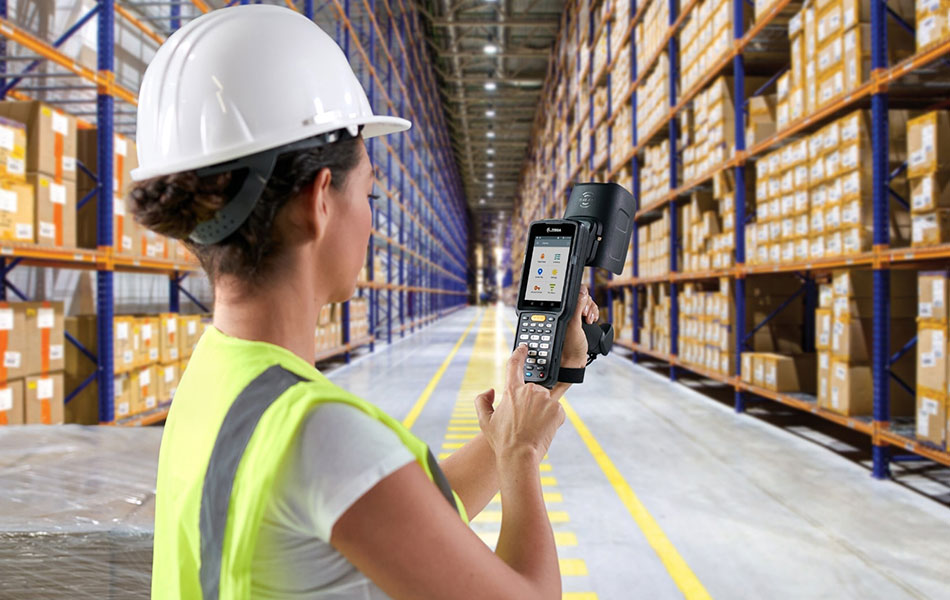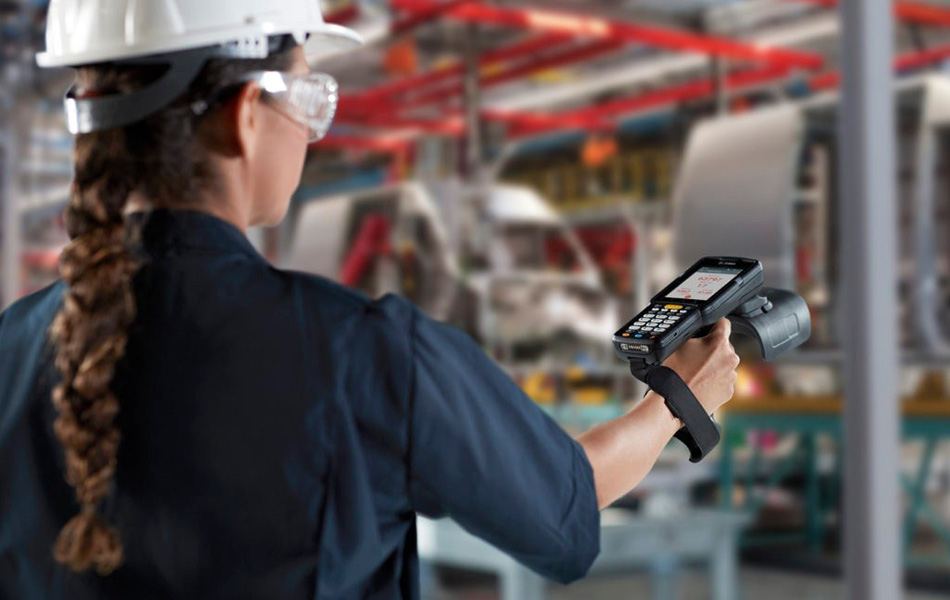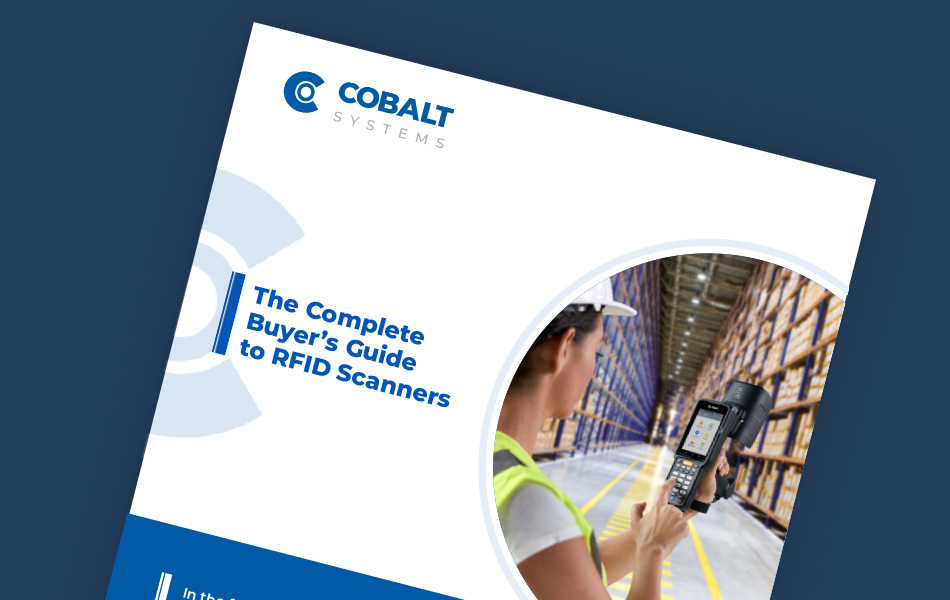In the fast-paced world of modern business, efficiency is paramount. Whether you’re operating a bustling warehouse, managing intricate logistics, or keeping a keen eye on your inventory, the right tools can make all the difference. One such tool that has revolutionised these domains is the RFID scanner. In this comprehensive RFID buying guide, we will delve into the world of RFID scanners, exploring their myriad benefits and providing valuable insights into how they can transform your operations.
Want to learn about a specific business application for RFID solutions? Click on the links below to skip to a chapter.
- A Brief Overview of RFID Scanners
- Advantages of Using RFID Scanners
- RFID in Warehousing
- RFID in Logistics
- RFID in Inventory Management
- RFID Tagging: Usage Examples
- Integrating RFID Into Your Operations
A PDF version of this RFID buying guide is also available to download at the bottom of the page.
RFID Scanners: A Brief Overview
RFID, or Radio-Frequency Identification, is a technology that uses electromagnetic fields to identify and track tags attached to objects automatically. RFID scanners are the indispensable instruments that enable this process. They emit radio waves and capture data from RFID tags, offering a non-contact, efficient, and highly accurate means of identification and data collection, which can be used to track individual items or to check tagged products in bulk – all in real-time.
The Advantages of RFID Scanners
Speed and Accuracy
More advanced RFID scanners can read multiple tags simultaneously at high speeds of up to 1200 tags per second and beyond through features such as the FX7500’s “dense reader mode”. This translates into swift and error-free data collection, making them exceptionally useful in high-volume operations.
Real-time Tracking
Unlike traditional barcodes, RFID tags can be read without a direct line of sight. This means that items can be tracked throughout their journey, providing real-time insights into their location and status.
Data Enrichment
RFID technology allows for storing a vast amount of data on each tag. This enables you to gather more information about your products or assets, such as manufacturing date, expiry date, or unique identifiers.
Durability
RFID tags are robust and can withstand harsh environmental conditions, including exposure to dust, moisture, and extreme temperatures, making them ideal for various industries.
In the next section of this RFID Buying Guide, we’ll explore how RFID scanners can be exceptionally useful in three critical business settings: warehousing, logistics, and inventory management. We’ve also included recommendations and links to some of the industry’s leading inline and mobile RFID solutions from Zebra.

RFID Scanners in Warehousing
Efficient warehousing operations are the backbone of any successful business, and RFID scanners play a pivotal role in optimising these processes.
Inventory Accuracy
RFID scanners offer unparalleled accuracy in inventory tracking. By using RFID tags on each item, you can instantly verify stock levels, reducing the risk of stockouts or overstock situations. This precision allows for streamlined reordering processes, reducing operational costs and increasing customer satisfaction.
Time Efficiency
With the ability to scan multiple items at once, RFID scanners dramatically reduce the time required for stocktaking. This means less downtime, increased productivity, and the opportunity to allocate human resources to more value-added tasks. Some RFID scanners are designed for very long-range scanning, allowing for RFID tags to be read at the top of high shelves and racks or across the warehouse floor.
Error Reduction
Human errors are inherent in manual data entry processes. RFID scanners virtually eliminate these errors, ensuring that the data you rely on for decision-making is consistently accurate.
RFID Scanners in Logistics
Smooth logistics operations are vital for delivering products to customers efficiently. RFID scanners can help you achieve just that.
Real-time Tracking
RFID scanners provide real-time visibility into the movement of goods, enabling you to monitor their progress throughout the supply chain. This transparency is invaluable for identifying bottlenecks and optimising routes for faster deliveries. There are many rugged handheld RFID scanning solutions available that are ideal for outdoor use in ports and other tough environments that your goods may pass through throughout your supply chain. RFID sledges even allow some standard handheld barcode readers to be adapted for RFID reading.
Security
RFID tags can be used in conjunction with tamper-evident seals to enhance security and enable the concurrent tracking of packages. This helps to ensure that your products reach their destination in the condition they left your facility.
RFID Scanners in Inventory Management
Inventory management is a complex task that RFID scanners can significantly simplify. Both fixed and handheld RFID solutions have a place in inventory management, whether used for manual checking of products, or automatically tracking items.
Reduced Shrinkage
RFID scanners help prevent theft and reduce shrinkage by monitoring the movement of assets. Any unauthorised removal can be set up to trigger an alert, allowing for immediate action and recovery of the stock. Transition scanners and fixed scanners such as the Zebra FX Series allow the event of stock loss to be narrowed down to specific points in a production line – making it easier to determine whether the incident has occurred on the warehouse floor, in transit between facilities, or during packing.
Demand Forecasting
Accurate, real-time inventory data from RFID scanners facilitates more precise demand forecasting. This, in turn, helps optimise stock levels, reduce carrying costs, and improve cash flow.

RFID Tagging: The Best Examples of RFID Tags in Use
RFID labels can be used in a multitude of different environments, from logistics to retail and warehousing to health settings. As demonstrated throughout this guide, RFID labels can bring huge benefits and efficiencies to your operations; here are some of the real-world examples of RFID tags in use in different settings:
High value retail security
One of the most popular everyday uses of RFID tags in retail is keeping track of high-value items within a shop floor. For example, having an RFID tag attached to steaks or expensive clothing items and having an RFID scanner at exits can give your security team knowledge of potential thieves.
Reusable packaging and reusable totes
In modern, environmentally-conscious packaging settings, using the same packaging or plastic totes to send items out has become more prevalent. Instead of wasting material creating one-use packaging, companies have started to use more long-lasting materials and reuse them after they are returned. The returns process can be sped up using RFID tags, helping you to know which totes have been returned and by which companies, allowing you to streamline your processes.
Tracking pallets through a system
RFID tags and scanners can be set up passively to ensure your production processes run smoothly and efficiently. You can set up RFID tags on pallets so that they trigger scanners during their movement through the process, letting you know where any bottlenecks are or giving you knowledge about the speed of movement of pallets. This information could be crucial in a production environment, and with RFID scanners set up in the right areas, it is easy to collate in a digestible format.
For example, the Zebra ST5500 Transition RFID Reader is designed to be set up at transition points throughout your production facilities, tracking both the direction and location of your tagged items.
Smart fitting rooms
One of the simplest, and yet most impressive, uses of RFID tags and scanners in a retail setting has been the introduction of smart fitting rooms. When entering a dressing room, consumers can scan items and have easy access to product data, alternative options, and a space to provide feedback. Not only does this increase the likelihood of a purchase and increase customer satisfaction, it can act as a theft-prevention mechanism in line with the other uses of RFID tags.
Integrating RFID into Your Operations
When it comes to integrating RFID scanners into your wider operation, Cobalt can help. We’re the RFID consultant company that considers your whole process and works for a solution that fits your business. Whatever size, whatever your requirements, and whatever you need, we’re here to help.
In today’s competitive landscape, investing in RFID scanners is a strategic move that can elevate your warehousing, logistics, and inventory management operations. Their speed, accuracy, and versatility make them indispensable tools for businesses seeking to stay ahead of the curve.
Make the smart choice and empower your business with RFID technology. Unlock the potential for improved efficiency, reduced costs, and enhanced customer satisfaction. Take the next step by booking a discovery call with our RFID expert today.

